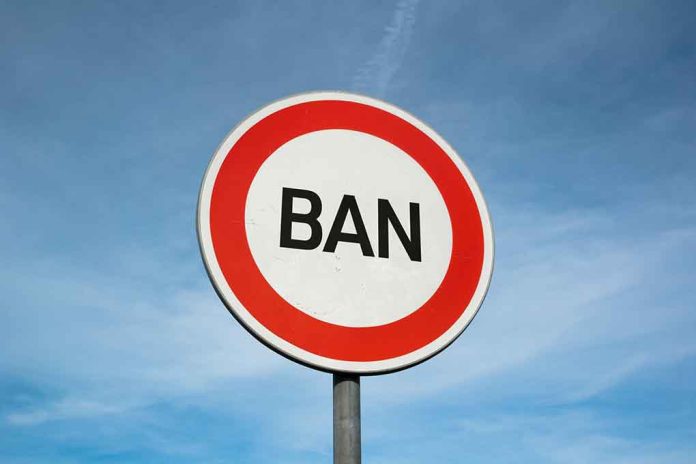
The United States has expanded its ban on imports from Chinese companies, adding 37 new entities to the Uyghur Forced Labor Prevention Act (UFLPA) Entity List.
At a Glance
- 37 Chinese companies added to the UFLPA Entity List, bringing the total to 144.
- Banned companies include Huafu Fashion Co. and 25 of its subsidiaries.
- Mining, solar, and textile sectors affected by the ban.
- Move aims to combat alleged forced labor practices in Xinjiang region.
- China disputes forced labor claims, calling the U.S. law “evil.”
U.S. Expands Import Ban on Chinese Companies
The Biden administration has taken decisive action to combat alleged forced labor practices in China’s Xinjiang region by expanding the Uyghur Forced Labor Prevention Act (UFLPA) Entity List. This move adds 37 Chinese companies to the list, primarily impacting the mining, solar, and textile sectors. The expansion brings the total number of restricted entities to 144, signaling the U.S. government’s continued commitment to eradicating forced labor and upholding human rights in international trade.
Among the newly banned companies are Zijin Mining Group, a subsidiary of JA Solar Technology Co., and textile manufacturer Huafu Fashion Co., along with 25 of its subsidiaries. The UFLPA prohibits the import of products from listed companies unless they can be proven free of forced labor, putting the onus on importers to ensure their supply chains are ethical.
U.S. bans imports from 37 more Chinese companies over Uyghur forced labor https://t.co/zCK8gWSLpN
— Nikkei Asia (@NikkeiAsia) January 14, 2025
Impact on Chinese Companies and U.S. Trade
The expansion of the UFLPA list has significant implications for Chinese companies, particularly those in the solar industry. Many Chinese solar companies are now shifting to more expensive polysilicon from Western countries to mitigate risks associated with the import ban. This move highlights the potential trade challenges these companies may face in the U.S. market moving forward.
China has vehemently disputed the forced labor claims, with Chinese Foreign Ministry spokesman Guo Jiakun calling the U.S. law “evil” and accusing it of interfering in China’s internal affairs. The Chinese government has pledged to “take resolute measures to firmly safeguard the legitimate rights and interests of Chinese enterprises.”
Focus on Huafu Fashion and Xinjiang Labor Programs
Huafu Fashion Co., a key target in this latest expansion, is notable for its vertically integrated supply chain in Xinjiang. Of the 25 Huafu subsidiaries added to the list, 22 are located in the Xinjiang region. The company has been linked to state-sponsored labor transfer programs, both within and outside Xinjiang, raising concerns about the nature of these employment practices.
Some of Huafu’s subsidiaries are connected to the Xinjiang Production and Construction Corps, an organization already sanctioned by the United States. Critics argue that the Chinese regime’s labor transfer programs in Xinjiang are coercive and aimed at reducing the Uyghur population density in certain areas.
U.S. Commitment to Human Rights
Homeland Security Secretary Alejandro Mayorkas emphasized the U.S. government’s commitment to fighting forced labor and defending human rights. This expansion of the UFLPA list, the largest since its inception in December 2021, demonstrates the continued effort to ensure that international trade aligns with ethical labor practices and respect for human rights.
As the situation develops, it remains to be seen how this expanded ban will impact global supply chains and trade relations between the United States and China. The move underscores the complex interplay between economic interests and human rights concerns in international commerce.
Sources:
- US Bans Imports From 37 China Firms Over Forced Labor Charge
- US bans imports from 37 more Chinese companies over Uyghur forced labor, including Huafu Fashion
- US Bans Imports From 37 Chinese Companies Over Uyghur Forced Labor




